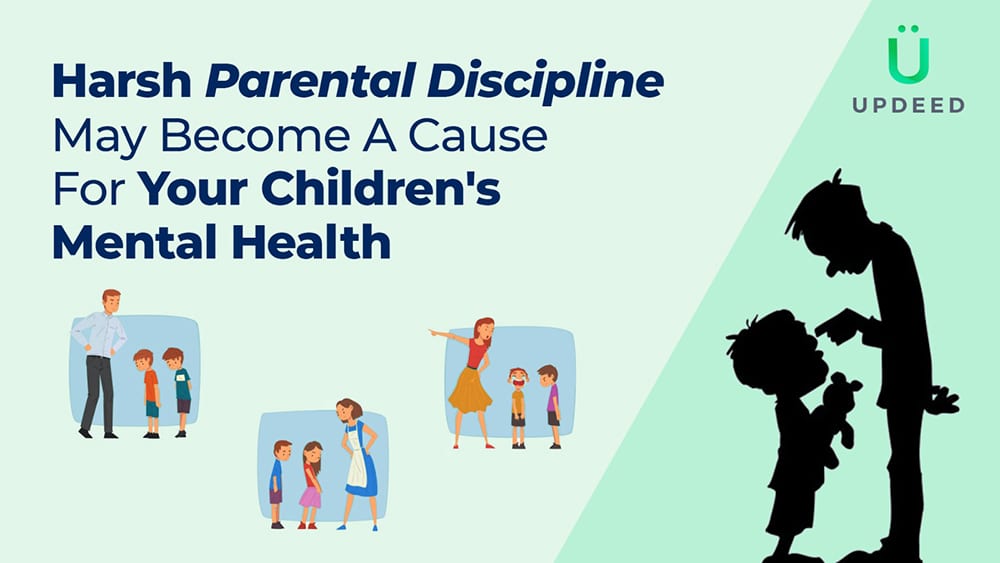Harsh Parental Discipline May Become A Cause For Your Children’s Mental Health
A collaborative study conducted by researchers from the prestigious Universities of Cambridge and Dublin has recently uncovered distressing evidence about the detrimental effects of harsh parental discipline on the long-term mental health of young children.
The study’s findings illuminate a disconcerting connection between frequent exposure to hostile parenting during early childhood and an elevated risk of enduring mental health issues.
In particular, the research reveals that children who experience such disciplinary practices at the tender age of three face a staggering 1.5 times greater likelihood of exhibiting mental health symptoms meeting the “high risk” criteria by nine compared to their peers.

Understanding the impact
The study delved deep into the intricate relationship between parenting styles and the psychological well-being of children. By meticulously analysing a comprehensive dataset encompassing a diverse group of participants, the research team shed light on parental behaviour’s crucial role in shaping a child’s mental health trajectory.
Their findings echo the consistent chorus of previous research, underscoring the profound and enduring effects of hostile parenting on children’s emotional well-being.
Hostile parenting, as defined by the study, entails severe disciplinary methods characterised by aggression, verbal abuse, and punitive actions. Children subjected to such parenting styles are at significantly higher risk of experiencing long-lasting mental health symptoms that extend well into their early years of development.
These symptoms are deemed “high risk,” implying a greater propensity for mental health disorders to manifest in the future.
The urgent need for intervention
These alarming research outcomes highlight the need for parental awareness and intervention to create nurturing and supportive environments for children. Positive parenting strategies centred on empathy, understanding, and constructive discipline techniques, can play a pivotal role in mitigating the risk of enduring mental health issues.
Encouragingly, various evidence-based programs and support networks exist to equip caregivers with the knowledge and resources necessary to foster their children’s mental well-being effectively.
To address the far-reaching implications, it is imperative to implement parental education programs that emphasise the importance of positive parenting practices.
Parental guidance: Society can empower parents to create environments conducive to their children’s emotional growth and resilience by equipping parents with the necessary knowledge and skills. These programs should provide insights into effective communication, conflict resolution, emotional regulation, and age-appropriate discipline methods.
Societal responsibility: The implications of this study extend far beyond academic circles. It calls for a collective societal effort to prioritise the mental health of young children. Society can cultivate a culture that promotes compassionate and supportive parenting by recognising parents’ profound influence in shaping their children’s well-being.
Early intervention programs: Implementing early intervention programs that specifically target families at risk of engaging in harsh parenting practices can be highly effective. These programs can offer parents support, guidance, and education during the critical early stages of their child’s life, emphasising the importance of nurturing relationships and positive discipline strategies.
Mental health support: Ensuring accessible and affordable mental health services for parents can greatly contribute to curbing harsh parental discipline. Providing therapy, counselling, and mental health resources to parents struggling with mental health challenges can help address the underlying issues contributing to harsh parenting behaviours.
Public awareness campaigns: Launching public awareness campaigns to educate the general public about the negative consequences of harsh parental discipline and the benefits of positive
parenting can create a societal shift in attitudes and behaviours.
Collaborative efforts: Collaboration between various stakeholders, including educational institutions, healthcare providers, community organisations, and policymakers, is crucial to address the issue comprehensively. These entities can develop coordinated approaches, share resources, and integrate support systems to create a nurturing environment for children and families.
Longitudinal studies: Conducting long-term longitudinal studies that follow families over an extended period can provide deeper insights into the effects of parenting practices on children’s mental health outcomes. These studies can help identify risk factors, protective factors, and effective intervention strategies, informing evidence-based policies and interventions.
It is important to remember that curbing harsh parental discipline requires a multifaceted approach that addresses individual, familial, societal, and systemic factors.
Conclusion
The research conducted by the Universities of Cambridge and Dublin serves as a poignant reminder of parental behaviour’s profound impact on a child’s mental health trajectory.
The evidence underscores the urgent need for positive parenting interventions, education programs, and support networks to address harsh parental discipline effectively. By prioritising the well-being of our children and fostering nurturing environments, we can empower them to thrive emotionally and lay the groundwork for healthier and happier generations to come.
Ready to make a positive impact in the world?
UPDEED is the place for you. Our free and open platform is filled with inspiring stories from individuals and organizations who are making a difference in their communities and beyond. Connect and collaborate with like-minded individuals from around the globe on UPDEED, and discover your own potential to create meaningful change. Join our community and make a difference.





